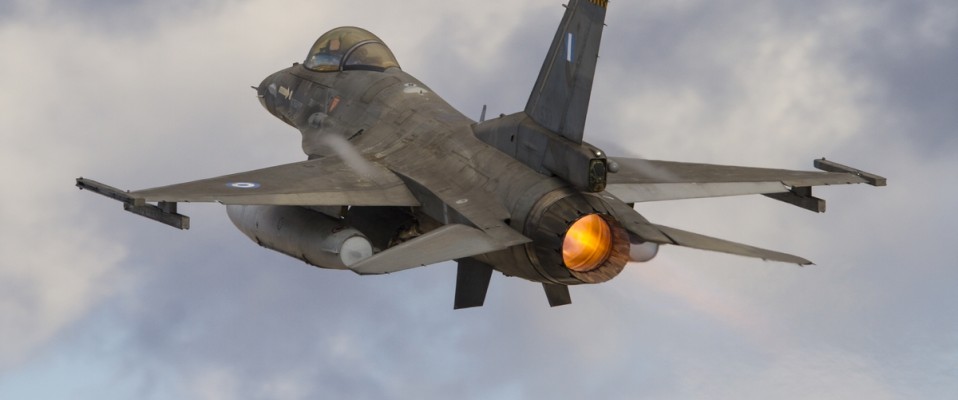A New Dawn For The Hellenic Vipers
Report and photos by George Karavantos
March 11, 2021
The need of the HAF to proceed to a modernization of its F-16 fleet appeared about a decade ago. This necessary step was postponed for many years in the past and because of its recent economical crisis the matter was frozen indefinitely.
At the same time, HAF was forced to withdraw older types of fighters which, due to their age were offering little to its operational capacity while absorbing significant resources. This process was started in October 2014 with the withdrawal of the A-7E and TA-7C Corsair II and continued with the withdrawal of the RF-4E Phantom II in May of 2017. These types of fighters, although covering a big number in the inventory of the HAF, were never replaced by a new type of fighter.
The officials of the HAF had come up with the optimal solution according to its needs and the remaining number of its 3rd generation fighter aircraft. The scenarios which were examined had also taken into account the economic situation of the country.
Despite the economical difficulties, the green light was recently given by the Hellenic government offering the HAF this necessary economical boost to materialize this project which although was frozen, it was so important for the national security.
The most cost-effective solution that combined the operational capabilities of the HAF was the upgrade of the latest F-16C/Ds that were acquired during recent years to the new F-16V standards. Specifically the Block 52 + which were acquired during the period 2002-2004 under the Peace Xenia III and the Block 52 + Advanced which were acquired during the period 2009-2010 under the Peace Xenia IV program.
The main components of this F-16V Block 72 upgrade are the new AESA radar AN/APG-83 SABR, the new Multi Mission Computer MMC 7000AH along with the Link 16 MIDS-JTRS datalink.
On the 28th of April 2018, the Greek government approved the plan to upgrade some of its F-16C/Ds to F-16V standards under a USD 1,45 billion contract. This contract was finally secured on the 20 December 2018 when the manufacturer Lockheed Martin Corp. was awarded with a USD 996,8 million firm-fixed-price contract for the Greek Vipers’ upgrade.
This Foreign Military Sales contract involves the upgrade of 84 Hellenic F-16 aircraft to the V version. The main work of this program will be performed mainly in Greece and is expected to be completed by June 2027. Only one aircraft will travel to Fort Worth, Texas and will be used as a testbed for the new systems.
This modernization program will not be the only one. HAF has plans to upgrade the remaining 38 Block 50s to Block 50+ Adv standards. These aircraft were delivered during the period of 1997-1998 under the Peace Xenia II program. The way of doing that will be by utilizing all the spare parts from the aircraft that are going to be upgraded. This plan is not part of the main upgrade programme, but it’s something that HAF will perform afterwards by itself.
The only Hellenic F-16 version that is not going to be upgraded is the Block 30 which was delivered almost 30 years ago. Despite the fact that they remain capable aircraft, they require extensive modernisation, both structurally electronically. Nevertheless there is also a plan for the older and more “tired” F-16s of the HAF.
The officials of the HAF have come up with different scenarios about the future of these aircraft. The main attempt of the HAF will be try to sell 12 aircraft to a third country, while the remaining 20 will continue to serve as transition aircraft in a future Operational Conversion Unit for the new Hellenic fighter pilots. A future squadron of 20 Aggressor aircraft could also be an option.
Greece is also considering the potential acquisition of up to 25 Lockheed Martin F-35s to replace these oldest F-16C/Ds operated by the country’s air force. “Beyond the upgrade of the F-16 fighter jets, we are in the process of selecting a new plane for Greece, so we can gradually move to the new generation of aircraft,” said Greek defence minister.
The interest from Athens in a fifth-generation fighter chimes with comments from Vice Admiral Mathias Winter, director of the Pentagon’s F-35 joint programme office, who told Congress that sales of F-35 jets could be expanded to include five new countries – Greece, Romania, Poland, Singapore and Spain.
Local media reports suggest that Athens has already requested pricing and availability for 20-25 examples from Lockheed. However, any purchase will depend on Greece’s financial plans and the USA’s ability to offer a long-term payment framework. Geoffrey Ross Pyatt, the US Ambassador to Greece, says that with Greece already upgrading some of its F-16s to the new V-model standard, it would be a “natural stepping stone” for the country to also acquire the conventional take-off and landing F-35A.
After the most recent news that Greece is going to acquire 18 state-of-the-art Rafales as a rapid response to the tension with its neighbour Turkey, one thing is already clear for the HAF’s future. That its inventory will be more shrinking after 2023-2024 since the remaining upgraded F-4E AUP Phantom II are going to end their career as well. Apart from them, the older F-16C/D Block 30s and Mirage 2000s EGM/BGM are also going to follow within the next decade. Apparently the main thrust in this direction is the protection and maximum utilization of the investment that the country was making for 30 consecutive years in order to create a capable deterrent effect.




